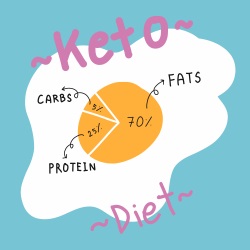Ketogenic Diets: What You Need to Know
 Friday, December 14, 2018 at 12:10PM
Friday, December 14, 2018 at 12:10PM 
 Ketogenic diets (Keto) have dominated the "popular” diet scene for the past two years, with no close contenders. Prior to Keto’s steady upsurge the popular-diet crown had long rested on gluten-free, although Paleo almost matched it for a few years.
Ketogenic diets (Keto) have dominated the "popular” diet scene for the past two years, with no close contenders. Prior to Keto’s steady upsurge the popular-diet crown had long rested on gluten-free, although Paleo almost matched it for a few years.
Looking further back (except for the ‘low-fat’ 1990’s) a variety of low-carbohydrate/high-protein diets (i.e., Atkin’s, The Zone, South Beach, etc.) have generally topped the public’s interest. One should at least wonder, if any of these diets really worked then why do they lose popularity only to be replaced by another?
So Considering Keto...
First of all, what is ketosis? Your brain and central nervous system function on only two fuels, glucose or ketones. Normally ketones would only come into play if you were literally starving—when carbohydrate intake is too low to provide enough fuel in the form of glucose. At that point your body shifts to converting the fuel it always has an abundance of (body fat) to ketones. Similarly, by limiting carbohydrate intake to just around 5% of energy intake (~20 to 50 grams per day) ketogenic diets trigger your body to shift into ketosis.
What is the theory behind ketogenic weight loss diets? Advocates of Keto assert that it's a path to easy weight loss due to to the following: First, because your body is utilizing fat as its main energy source that weight loss is faster. Second is the assertion that Keto has a “metabolic advantage” in the form of a bumped up metabolic rate. And the final assertion is better appetite regulation (you simply won’t be hungry) which makes lower calorie intake easier.
So how do these claims hold up? Ketogenic diets do shift energy metabolism to a predominantly fat-burning mode, but does this speed up weight loss? No, it does not. And actually there is no theoretical reason why it would speed weight loss because it does nothing that changes overall energy balance. We’d have to reconsider the laws of thermodynamics for that to be the case. Let’s look at two key studies.
The following two studies were both tightly controlled metabolic ward studies where every gram of energy intake and output (including urine and feces) were accounted for along with changes in body weight and composition (fat mass, lean body mass and water).
First is a classic nitrogen-balance study[1] comparing an 800-calorie ketogenic diet with an 800-calorie balanced diet both diets led to the same amount of body-fat loss and body-weight loss over the 50-day study. The ketogenic diet however, gave the appearance of more rapid weight loss in the beginning due to extra water losses: 61% versus 37% of early scale loss was water on the ketogenic and balanced diets respectively. Both diets contained the same amount of protein (50-grams) so they differed only in fat and carbohydrate.
More recently, an abbreviated version of this type of study was done by the National Institutes of Health comparing high-fat and high-carbohydrate diets.[2] Over the 6-day metabolic ward study the high-fat diet led to less fat loss than the high-carbohydrate diet (245±21-grams versus 463±37-grams respectively). Why the big difference, and why more fat loss on the high-carbohydrate diet? Because in the early stages of carbohydrate restriction the body breaks down and oxidizes protein (muscle) to maintain blood glucose levels. So in the short-term, the high-fat diet leads to greater muscle, glycogen, and water losses (creating the illusion of faster weight loss) than an equal-calorie high-carbohydrate diet. This well-known protein-sparing effect of carbohydrate is why medically-supervised very-low-calorie (liquid) diets are relatively high-carbohydrate/low-fat formulations.
The first two assertions of Keto advocates (an advantage to a higher rate of fat-burning and a general metabolic advantage) are shown to be false in these meticulous studies, and there are no competing metabolic ward studies that show otherwise.
Scores of studies over the past 40- to 50-years have compared various diets, and report a variety of results (mainly because they are too short or poorly designed, and sometimes outright bias). What is consistent however, is that whenever calories are held constant between two different diets, there is never a significant difference in weight loss. At this point it is exceedingly clear that any diet that creates an energy deficit leads to weight loss.[3],[4]
The Real world: People obviously don’t live in metabolic wards. In so-called "free-living" conditions, high protein diets consistently show greater weight loss at three months, and at six months. At one year however, the differences are no longer statistically significant. Why? First, both Keto and high-protein diets lead to excess loss of body water (for the first week or so). More importantly for the long term, the improved satiety effects of higher protein intakes lead to lower energy intake and therefor greater weight loss than a balanced or low-fat diet. Keto diets are only moderate in protein, but ketones have a strong satiety effect of their own[5],[6] which will certainly enhance the likelihood of maintaining a lowered energy intake. On the other hand, sticking to a ketogenic diet is especially challenging due to the severe level of carbohydrate restriction (5% of intake versus 40- to 55% of typical diet patterns).
The Bottom Line: of the three proposed advantages of keto diets only reduced appetite is a supportable claim. Given the laws of thermodynamics there is no theoretical reason why changes in fuel oxidation (increased fat-burning) would enhance weight loss. The same goes for the notion of “metabolic advantage” (which also fails to materialize in calorie-controlled studies).
Other important considerations: the long-term health effects of Keto remain to be determined.[7] Specific areas of concern include a negative impact on the microbiome (resulting in leaky gut, and autoimmune response and systemic inflammation[8]), reduced micronutrient intakes, enhanced loss of lean body mass, increased homocysteine levels, increased LDL-cholesterol and reduced bone mineral density via excess calcium excretion.[9]
Final thoughts: If you want success with your weight and health the tried and true approach is to learn how to eat in a healthy way and in healthy amounts. My best advise is to start where you are at, and look for "easy changes" to improve the quality of your diet. Forget "going-on-a-diet," instead approach it as a lifestyle change. It would also help a lot to understand more about how your body works. Here are some links that can help you get started:
All the Best!
-Dorene
PS--you might also be interested in: Can You Spot a Sham Weight Loss Diet?
References:
[1] Yang and Van Itallie: Composition of Weight Lost during Short-Term Weight Reduction: Metabolic responses of obese subjects to starvation and low-calorie ketogenic and nonketogenic diets. J Clin Invest 1976;58:722-730.
[2] Hall K, et al.: Calorie for Calorie, Dietary Fat Restriction Results in More Body Fat Loss than Carbohydrate Restriction in People with Obesity. Cell Metabolism 2015;22:427-436.
[3] Obert J, et al.: Popular Weight Loss Strategies: a Review of Four Weight Loss Techniques. Curr Gastroenterol Rep 2017;19(12):61.
[4] Atallah R, et al.: Long-term effects of 4 popular diets on weight loss and cardiovascular risk factors: a systematic review of randomized controlled trials. 2014;7(6):815-827.
[5] Gibson aa, et al.: Do ketogenic diets really suppress appetite? A systematic review and meta-analysis. Obes Reviews 2015;16:64-76.
[6] Johnstone AM, et al.: Effects of a high-protein ketogenic diet on hunger, appetite, and weight loss in obese men feeding ad libitum. Am J Clin Nutr 2008;87(1):44-45.
[7] Hamdy O, et al.: Fat Versus Carbohydrate-Based Energy-Restricted Diets for Weight Loss in Patients with Type 2 Diabetes. Curr Diab Rep 2018;1812(128).
[8] Tambo A, et al.: The Microbial Hypothesis-Contributions of Adenovirus and Metabolic Endotoxaemia to the Pathogenesis of Obesity. Intl J Chron Disease 2016;7030795.
[9] Adam-Perrot A, et al.: Low-carbohydrate diets: nutritional and physiological aspects. Obes Rev 2006;7(1):49-58.





